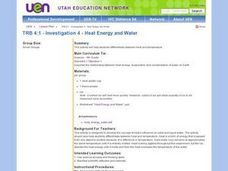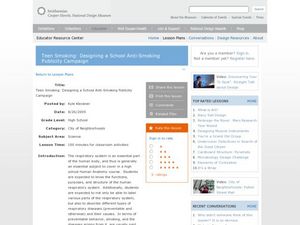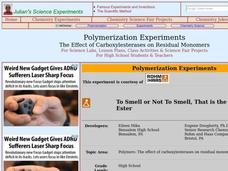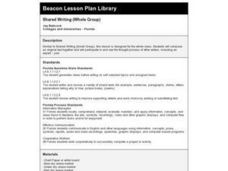Curated OER
Impromptu and Extemporaneous Speeches
Learners brainstorm and agree on a topic that is interesting to both the speaker and the audience and research it with both tradition and non-traditional sources. They write and outline the body of the speech and translate the speech...
Curated OER
Personal and Civic Responsibility
Students identify the civic responsbilities of those living in a constitutional democracy. In groups, they brainstorm a list of those characteristics of a good citizen. They participate in various scenerios to identify the...
Curated OER
Campus Nitrogen Budget
Students are given guidelines to college level nitrogen budgeting. Students brainstorm the campus links to nitrogen budget. Students pick topics or subtopics for individual or group research. Students develop research plan, keep good...
Curated OER
Calculating Volume
Young scholars evaluate mathematical problems using the formulas for volume. They recognize "perspective" in different shapes including cubes, pyramids and cylinders. Students practice on brainstorming all the different shapes and how...
Curated OER
Writers Workshop
Students work together to brainstorm using a software program. Individually, they decide on a topic to write about and begin their pre-writing activities. They write about their topic using the pictures they previously drew and...
Curated OER
Heat Energy and Water
Fourth graders brainstorm the differences between heat and temperature. In groups, they determine the best way to melt ice without touching the ice. They record their observations and compare them with other groups. To end the lesson,...
Curated OER
The Structure of Materials
Students brainstorm what matter is and how they define it. They construct a water molecule with marshmallows and toothpicks. In addition, they watch videos to explore the use the idea of nanoscience to investigate the properties of...
Curated OER
How Structure Can Affect Properties Through Phase Changes
Middle schoolers discuss how changing the structure of atoms and molecules can change the properties of a substance. They brainstorm and review their own examples of phase change with the help of a phase change diagram. Students describe...
Curated OER
A Race to Watch: Campaign 2008, The Role of Technology and the Internet
Students listen to a statement about the role the Internet plays in the political process and respond by placing a card under the appropriate agree/disagree sign at the front of the room. Students brainstorm reasons to select their...
Curated OER
Describe a Person
In this descriptive paragraph instructional activity, students choose one friend or family member and brainstorm information that describes them in detail. Students then write their brainstorm information into complete sentences....
Curated OER
History of Flight Timeline
Students research flight timelines and record their findings. In this flight lesson plan, students brainstorm with a KWL chart on what they want to learn about the history of flight. They then make a timeline of their findings, and...
Curated OER
Genetic Engineering
Students discuss the risks and benefits associated with biotechnology. In this biotechnology lesson, students discuss the role of genes in the body and brainstorm ethical issues relating to biotechnology. They read about an ethical issue...
Curated OER
Teen Smoking: Designing a School Anti-Smoking Publicity Campaign
Students review the human respiratory system and the effects on the human body. In this design lesson plan students brainstorm and create a prototype then present it to the class.
Curated OER
Unleashed: Poems by Pets
Students create a poem from the first person perspective of a pet. In this Writing/Poetry instructional activity, students read a short poem from, Unleashed. Students brainstorm what their animal may say. Students write a poem using the...
Curated OER
Semicolons
Sixth graders write a paragraph using semicolons. In this semicolons lesson plan, 6th graders brainstorm examples of semicolon use as a class and then write their own paragraph.
Curated OER
What Do You Do With An Orphaned Cheetah?
Students brainstorm techniques for teaching baby cheetahs survival skills. In this science lesson, students view an episode of "Cheetah Orphans" and work together to analyze the situation and develop a plan to teach the baby cheetahs the...
Curated OER
Polymerization Experiments
Students explain the process of polymerization. For this chemistry lesson, students produce carboxylesterase in the lab. They test its effectiveness in removing the by-product odor.
Curated OER
Herbal Medicines
Students become critical thinkers about substances that are called medicines and it guides them into an inquiry process of carrying out their own investigations of the attributes of some common herbal remedies.
Curated OER
Cultural Multimedia Projects
Fifth graders research a cultural element (art, music, literature, food, clothing, religion, etc) and work as a group to create a multimedia presentation. This lesson focuses on the process of creating a multimedia presentation.
Curated OER
Aerobic and Anaerobic Conditioning
Students view the A.D.A.M. computer simulation of aerobic and anaerobic exercise. They break into groups and members brainstorm and list as many aerobic and anaerobic exercises as possible in five minutes.
Curated OER
Shared Writing (Whole Group)
Students participate in a whole class shared writing activity. They create an original text while examining the thought process of writers.
Curated OER
Juvenile Justice - Consequences Of Offenses To Offenders, Victims, And Community
Students learn of the consequences of juvenile crime and how the state of Washington includes victims in the juvenile justice process.
Curated OER
Life at Risk
Students examine the characteristics of the peregrine falcon. They investigate endangered and extinct species, and how the environment affects the process.
Curated OER
Main Idea and Supporting Details
High schoolers identify main idea and supporting details from a short reading selection using a two-column note taking process. In this literacy lesson, students work in groups of three to four, then compare their papers with the other...

























